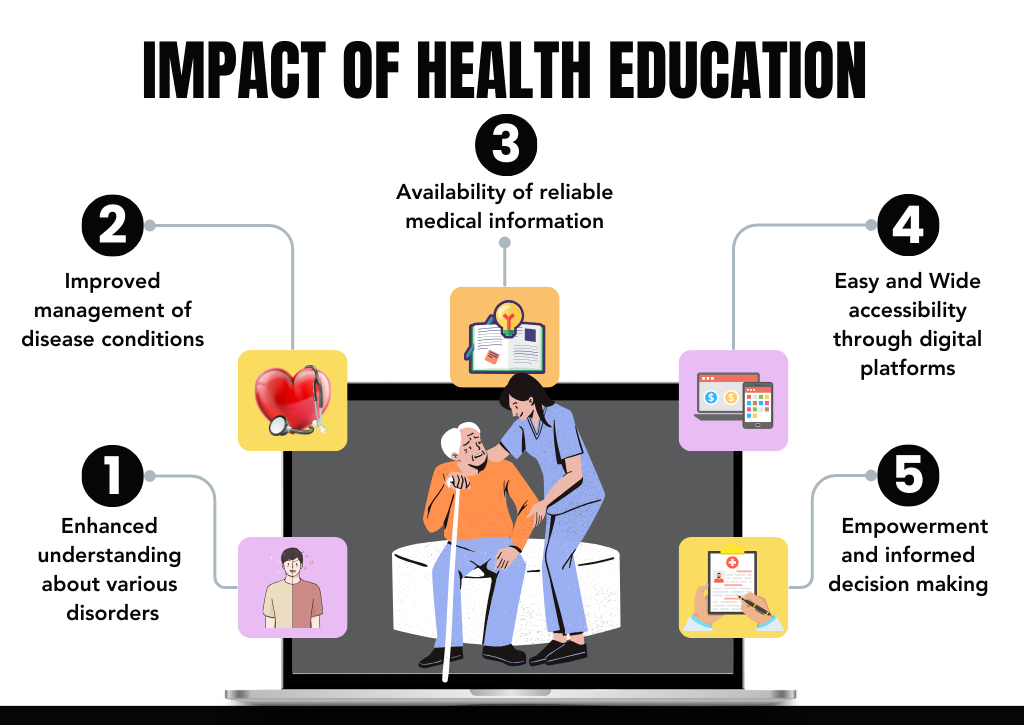Health Education Matters: Fostering
Inclusive Learning for Patients and Caregivers
Executive Summary
- 🌟 Vision: Empowering global communities through accessible and authentic health education material.
- 🚀 Mission: Curating comprehensive digital learning resources led by expert faculty, enabling patients and caregivers to proactively manage health challenges worldwide.
- 🤝 The Driving Force: The Institute of Health Innovation and Education, a registered non-profit organization in the Texas, United States
- 🎈 Our Path: Engaging experienced faculty affiliated with our institution to ensure accurate, updated, and tailored content for our target audience's needs.
- 📈 Current Progress: We have developed Neurology Pocketbook based on various neurological and psychiatric disorders https://neuropkbk.neurocare.ai/
- ⏰ Future Plans: We are ready to develop more content on various disease conditions
- 📍 Rollout Strategy: We will disseminate the education content at a global level through digital platforms.
Why Fund?
Join us in shaping the future of healthcare! Your partnership empowers us to pioneer cutting-edge health education initiatives, equipping patients and caregivers with the knowledge to navigate health challenges confidently.
5 billion people globally which would be equivalent to less than $0.00002 per person for one year!
Sponsorship Packages
Large-Scale Sponsorship
- We possess the capability to develop & disseminate digital health material for patients & caregivers based on various diseases and health conditions.
Sponsorship starting from $400,000, ensuring sustainable support for development and dissemination of health education material along with the fine tuning of LLMs.
Goal
Literature Review and Gap Analysis
Digital literacy refers to the combination of skills, knowledge, and attitudes necessary for effectively navigating and communicating in the digital realm (Selwyn N, 2020). The concept of digital health, which originates from eHealth, can be defined as the utilization of information and communication technology to support health-related fields. It encompasses various technologies, platforms, and systems that engage individuals for lifestyle, wellness, and health-related purposes, facilitate the collection, storage, or transmission of health data, and provide support for life science and clinical operations (Lavorgna L et al., 2018). Successful treatment usually relies heavily on accurate information and effective communication. Digital health literacy holds particular significance for patients and caregivers. It can assist patients and caregivers in the following ways (Bruke T and William K, 2017):
- Enhancing understanding of their conditions: By possessing digital health literacy skills, patients and caregivers can access dependable information from credible sources regarding disease conditions, symptoms, and available treatment options. This knowledge enables them to better comprehend their condition and make informed decisions about their care.
- Improving communication with healthcare providers: Digital health literacy empowers patients and caregivers to engage in more effective communication with healthcare providers through mediums such as email, telehealth, and other digital tools. This improved communication can foster better relationships between patients and providers, alleviate anxiety related to appointments, and facilitate improved management of symptoms.
- Encouraging active participation in care: Digital health literacy enables patients and caregivers to actively engage in the care process by participating in online support groups, accessing educational materials.
According to literature the prevalence of limited health literacy in patients and caregivers varies between 0% and 52.5% (Yuen EY et al., 2018). Studies have found associations between low health literacy in caregivers and the following: (i) Poorer patient management behaviors (ii) Increased utilization of health services by care recipients, (iii) Increased burden on caregivers (Yuen EY et al., 2018). Another study conducted by Rooney MK et al. (2021) revealed that low health literacy is linked to higher rates of hospitalizations, greater reliance on emergency care, and lower utilization of preventative care measures.
Digital sources have the potential to greatly enhance the health literacy of patients and caregivers. In a study conducted in the United States, researchers analyzed the questions and responses posted on the health care based websites by patients and their caregivers. The study found that people commonly sought information about their recommended treatments, unresolved questions from their doctors, and health habits. The majority of individuals considered the information on the internet to be of good quality (Efthymiou A et al., 2017). However, an important concern associated with web-based content is its reliability, reputation, and accuracy. Information should be presented in a clear manner, with accurate and up-to-date details supported by proper references. Research has shown that approximately 72.5% of websites contains huge flow of advertisements which creates unwanted distraction and decreases usefulness. Moreover, a significant portion of information on websites provides misleading information or inaccurately cited scientific references (Martini M and Bragazzi NL, 2021).
Considering these findings, several studies have concluded that validated digital resources provide more reliable results compared to general search engine results, such as those obtained from Google (Efthymiou A et al., 2017). According to the American Medical Association (AMA) and the National Institutes of Health (NIH), it is recommended that patient materials are prepared equivalent to the sixth and eighth grade level, respectively. An extensive review of 2,585 patient education materials, it was found that only 54 (2.1%) of the materials met the American Medical Association’s recommendation of a sixth-grade reading level, while 215 (8.2%) met the National Institutes of Health’s recommendation of an eighth-grade reading level (Rooney MK et al., 2021).
This emphasizes the importance of ensuring the availability of suitable and validated patient education materials that are easily accessible to patients and their caregivers.
Project Aims
The aims of the grant proposal are:
- Provide Valuable Information: Our aim is to create comprehensive course material that offers valuable information to patients and their caregivers. We strive to provide content that is reliable, up-to-date, and tailored to meet their specific needs, empowering them with the knowledge necessary to understand their disorders.
- Enhance Understanding and Accessibility: We aim to enhance the understanding of patients and caregivers regarding the disorders they are dealing with. By offering wide access to relevant and reliable information, our goal is to empower them to better comprehend their conditions and the challenges they may face, ultimately enabling them to make informed decisions and manage their care effectively.
- Maximize Impact: By leveraging digital platforms, our project aims to maximize its impact. We strive to reach and engage with a broader audience, including individuals who may not have access to specialized healthcare information. Through effective dissemination and engagement, we aim to empower patients and caregivers on a larger scale. Moreover, the content will be developed in various languages to cover larger group of people.
Example for Disease Specific Course Outlines
Module 1: Introduction to Digital Health Literacy
- Understanding the concept of digital health literacy and its relevance to managing anxiety disorders
- Exploring the benefits and challenges of using digital health resources for patients and caregivers
- Introduction to digital tools and platforms for accessing health information on anxiety disorders
- Learning how to search, browse, and evaluate online sources of health information
- Understanding how to critically evaluate the credibility and reliability of health information online
- Recognizing potential biases and misinformation in digital health resources
- Developing effective communication skills for interacting with healthcare providers through digital channels
- Exploring telehealth and virtual care options for anxiety disorder management
- Introduction to different types of anxiety disorders (e.g., generalized anxiety disorder, social anxiety disorder, panic disorder)
- Understanding the symptoms, causes, and impact of anxiety disorders on patients and caregivers
- Exploring evidence-based treatment options for anxiety disorders, including therapy and medication
- Understanding the role of digital tools and resources in supporting anxiety disorder treatments
- Learning self-help strategies for managing anxiety and promoting well-being
- Exploring digital resources, apps, and online communities that provide support for individuals with anxiety disorders
- Understanding the importance of privacy and security when using digital health resources
- Learning how to protect personal health information and navigate privacy settings
- Exploring ethical considerations related to accessing and sharing health information online
- Understanding the boundaries of online support and seeking professional guidance when needed
- Applying digital health literacy skills to find and evaluate online resources on anxiety disorders
- Developing personalized strategies for utilizing digital health resources in anxiety management
Course Development Faculty Team
- Team Lead: Junaid S Kalia MD, BCMAS

Neurocritical Care, Stroke & Epilepsy Specialist
Founder, AINeuroCare Academy Digital Medical Education
Editor-in-Chief; NeurologyPocketbook.com
Email: [email protected]
Personal Website: https://junaidkalia.com
Dr. Junaid Kalia has been playing an active role in the field of adult learning for Digital Health Literacy. His expertise and passion for this subject have led him to be an advocate on both national and international platforms. Through his engaging speeches and presentations, he has been spreading awareness and knowledge about the importance of digital health literacy. Additionally, Dr. Kalia’s active presence on social media further amplifies his efforts in reaching a wider audience and making a positive impact in this area.
YouTube Channel: https://www.youtube.com/@junaidkaliamd
INVITED SPEAKER – NATIONAL & INTERNATIONAL CONFERENCES
- February 2022 – 2nd Dubai Neurology Hybrid Congress: Artificial Intelligence in Acute Ischemic Stroke
- March 2022 – Pakistan Society of Neurology Annual Conference 2021: Role of Artificial Intelligence in Telestroke: An overview by Dr. Junaid Kalia
- March 2022 – Aga Khan University – Neurology Certificate Course: Artificial Intelligence In Neurological Diagnosis And Management
- April 2022 – Medical Education, Research, International training and transfer of Technology (MERIT): Digital Clinical Trials – Healthcare Innovation & Entrepreneurship Webinar
- Co-Lead: Saira Kalia, MD, MBBS

Associate Professor of Psychiatry, Clinical Scholar Track, Department of Psychiatry, University of Arizona College of Medicine – Tucson, AZ (UACOM-T)
Founder and Director, Perinatal Psychiatry Clinic and Track, Banner University Medical Center – South (BUMC-S)
Associate Program Director for Psychiatry Residency Program, BUMC-S
Email: [email protected]
Personal Website: https://sairakalia.com
- Team Member: Faisal Jahangiri, MD, CNIM, D.ABNM, FASNM, FASET
President & CEO, Global Innervation LLC
Director, Intraoperative Neuro Monitoring (IONM) Fellowship/Diploma Programs
Diplomate, American Board of Neurophysiological Monitoring
Assistant Professor of Instruction, The University of Texas at Dallas, Richardson, TX
Adjunct Instructor, College of Health Sciences, Rush University, IL
Adjunct Professor, Labouré College of Healthcare, Milton, MA
- Team Member: Awais Khan, MD
Nervous System Block Director, MS1, College of Medicine
Facilitator in Clinical Reasoning Course for MS1 and MS2- Banner University of Arizona
Associate Clerkship Director- Banner University of Arizona
Assistant Professor Clinical Neurology- Banner University of Arizona
● Team Member: Mushhood Ur Rehman
Chief Scientific Officer at NeuroCare.AI
Extensive experience in supervising Digital Healthcare based projects
Post graduate certificate in stem cells and translational neurology, The University of Edinburgh, Edinburgh, United Kingdom
Post graduate certificate in palliative care, National University of Medical Sciences, Rawalpindi, Pakistan
● Team Member: Reeda Saeed
Chief Operating Officer at NeuroCare.AI
Extensive experience of working on Artificial Intelligence in Medicine and Digital Healthcare based projects
M.S. in Computer Science, GIK Institute of Engineering Sciences and Technology, Topi, Pakistan
B.S. in Computer Science, COMSATS University, Islamabad, Pakistan
Project Impact
The impact of our project can be summarized in the following points:
- Enhanced Understanding: By providing valuable information, our project enhances the understanding of patients and caregivers regarding various disorders. This increased knowledge empowers them to make informed decisions and better manage the challenges they may encounter.
- Improved Management: Equipped with relevant and reliable information, patients and caregivers are better able to manage disease conditions. They gain the necessary tools and understanding to navigate their healthcare journey effectively, leading to improved outcomes and quality of life.
- Expertise and Reliability: The involvement of experienced faculty members ensures the highest quality of content. Their expertise and affiliation with our institution guarantee that the course material is reliable, up-to-date, and tailored to meet the specific needs of our target audience.
- Wide Accessibility: By utilizing online platforms and social media channels, we ensure easy accessibility and convenience for patients and caregivers. This broad dissemination strategy allows us to reach a wider audience, including individuals who may have limited access to traditional educational resources.
- Empowerment: Our project aims to empower patients and caregivers by equipping them with the knowledge and understanding necessary to navigate disease conditions more effectively. This empowerment enables them to actively participate in their care, make informed decisions, and advocate for themselves or their loved ones.
The impact of our project extends beyond the immediate educational resources. By empowering patients and caregivers with knowledge and understanding, we contribute to their long-term well-being, enabling them to make informed choices, advocate for their needs, and lead healthier lives (Figure 1).

Figure 1: Impact and benefits of spreading Digital Health Literacy among patients and caregivers
References
Burke, T., & Williams, K. (2017). Digital health in neurology: what you need to know. Practical Neurology, 17(4), 259-269.
Efthymiou, A., Middleton, N., Charalambous, A., & Papastavrou, E. (2017). The association of health literacy and electronic health literacy with self-efficacy, coping, and caregiving perceptions among carers of people with dementia: research protocol for a descriptive correlational study. JMIR research protocols, 6(11), e8080.
Lavorgna L, Brigo F, Moccia M, et al. e-Health and multiple sclerosis: an update. Mult Scler. 2018;24(13):1657–1664.
Martini, M., & Bragazzi, N. L. (2021). Googling for neurological disorders: from seeking health-related information to patient empowerment, advocacy, and open, public self-disclosure in the neurology 2.0 era. Journal of Medical Internet Research, 23(3), e13999.
Rooney, M. K., Santiago, G., Perni, S., Horowitz, D. P., McCall, A. R., Einstein, A. J., … & Golden, D. W. (2021). Readability of patient education materials from high-impact medical journals: a 20-year analysis. Journal of patient experience, 8, 2374373521998847.
Selwyn, N. (2010). Looking beyond learning: Notes towards the critical study of educational technology. Journal of Computer Assisted Learning, 26(1), 65-73.
Yuen, E. Y., Knight, T., Ricciardelli, L. A., & Burney, S. (2018). Health literacy of caregivers of adult care recipients: A systematic scoping review. Health & social care in the community, 26(2), e191-e206.
The need for modern care and education system has never been greater. Sign up for our newsletter.